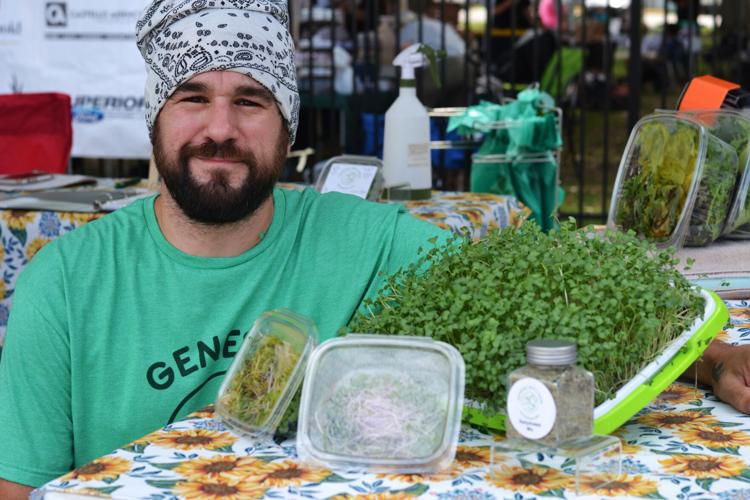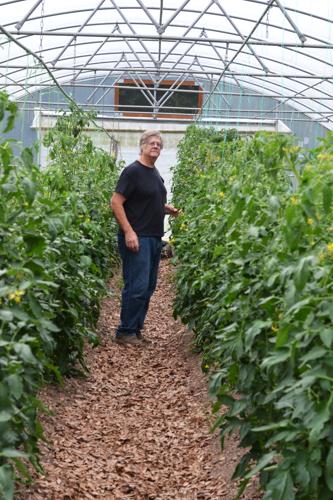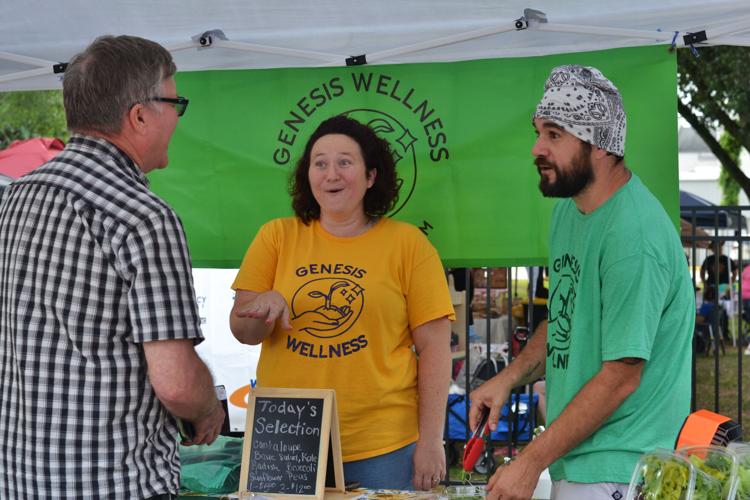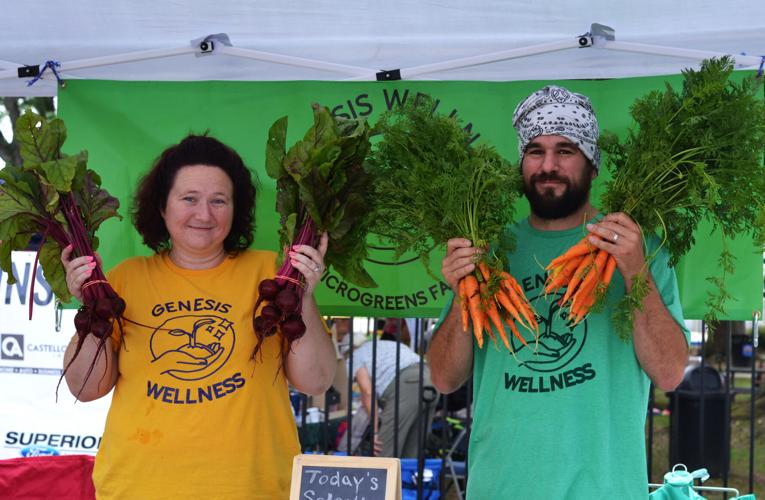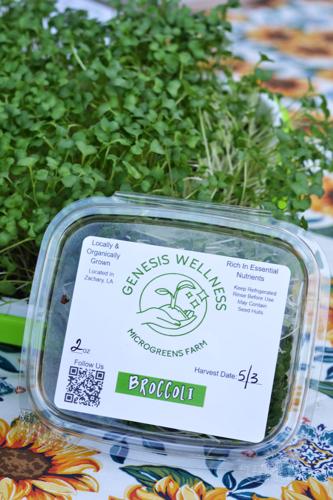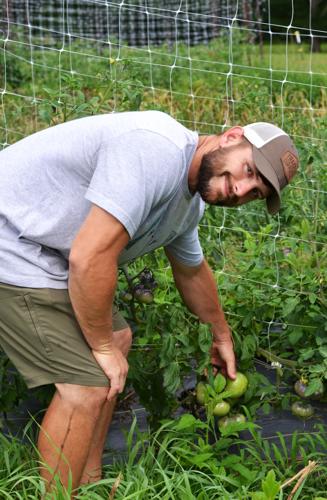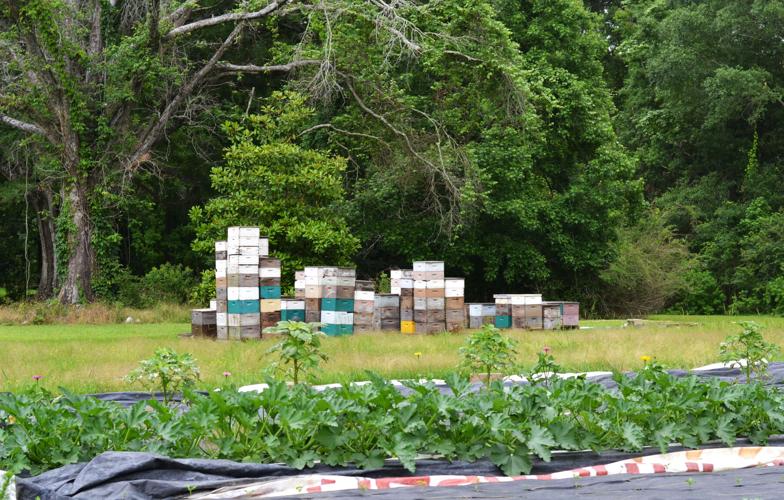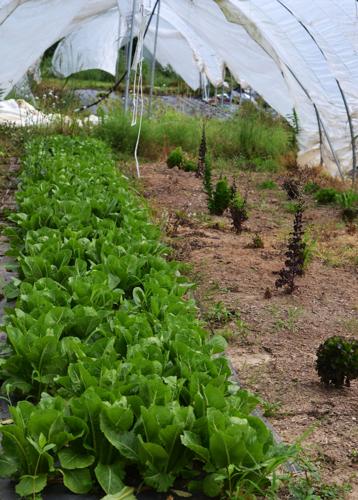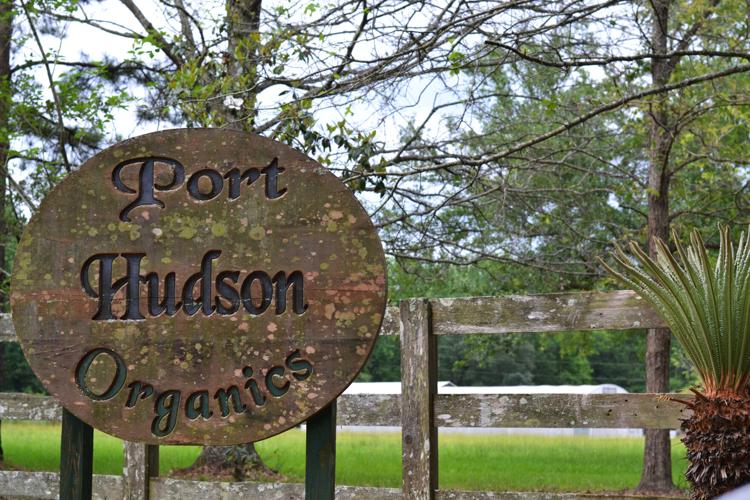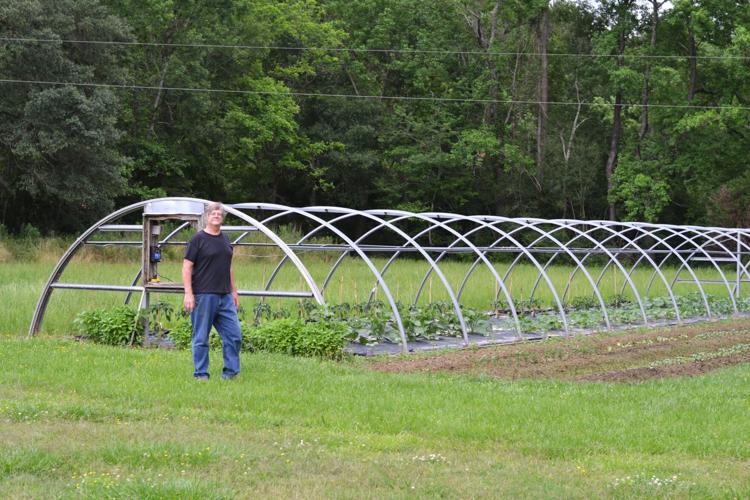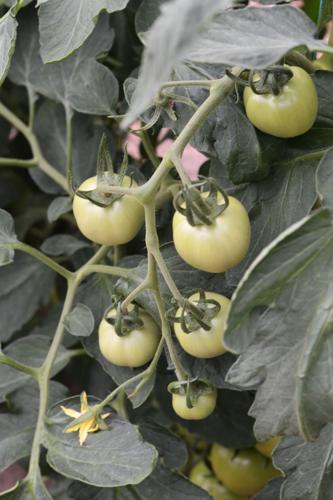The price tag for securing fruit and vegetables from around the world may include a toll on freshness and well-being, but a group of area farmers are rewriting the farm-to-table schedules while bolstering health and wellness in Zachary and the Felicianas.
Michael Cobb, of Genesis Wellness, Justin Kennedy, of Kennedy Family Farms, and Will Perkins, of Port Hudson Organics, share a commitment to natural farming techniques free of chemical pesticides and operations that provide, for example, that food harvested on Friday can be purchased Saturday morning at area stores and farmers markets.
Growing, gathering and harvesting food is as old as time, but farm-to-table is a fairly new social movement that promotes serving local food at homes, restaurants and schools directly from the producer.
Farmers markets provide a great direct sales arrangement, and all three farms can be found at area farmers markets.

Ashley Cobb, center, and Michael Cobb of Genesis Wellness offer a sample of their freshly harvested microgreens Saturday, May 4, 2024, at the Zachary Farmers Market.
Cobb was greeting patrons at the Zachary Farmers Market May 4 with a near evangelical excitement for his Genesis Wellness microgreens. He emphasized the nutritional advantages of microgreens and his indoor growing methods.
“They are baby green — a sprout would be I think four to five days old is what's considered a sprout and seven to 14 days growth is considered a microgreen,” he said. “They're denser and that nutrition is compacted into that little 2-to-3-inch green.”

Justin Kennedy, of Kennedy Family Farms in Slaughter, inspects young organically grown tomato plants May 4.
Genesis Wellness started about a year ago inspired by Genesis 1:29: "And God said, 'behold, I have given you every plant yielding seed that is on the face of all the earth, and every tree with seed in its fruit. You shall have them for food.’”
Microgreens used include broccoli, peas and cantaloupe. Cobb can grow microgreens year-round in a climate-controlled space and it has become a family affair. “I started teaching my kids how to grow microgreens to try to get them into agriculture,” he said.
Kennedy, like Cobb, was motivated by his family. He initially wanted to provide healthy food to his family and he and his wife were able to make all the baby food eaten by their first child.
“My goal originally just to grow my backyard garden for myself for good health,” he said. “For my firstborn, we made all of his baby food for the year and a half. That was a cool experience. We made sweet potatoes, butternut squash, green beans — anything that you can make into baby food.”
Kennedy’s backyard hobby has evolved into sophisticated farming and distribution system on a larger tract of land and now he is producing more than 60 varieties of produce in a year-round growing operation. He emphasizes the importance of freshness, nutritional value, and the importance of improving soil quality through sustainable farming practices.
Organic farming eliminates chemical pesticides that have been found to be harmful to people, creatures and the environment.
Kennedy promotes a symbiotic relationship between crops and pollinators. Honeybees are both workers and producers.
“Absolutely, why poison myself for the appearance of not having one grass here, Kennedy said. “The bees love me for it. These bees are thriving, a lot of bees die in other places that have chemical-based agriculture around them and chemical plants and stuff within a certain distance.”
Kennedy works to bring crops to harvest and to enhance what is left behind — the dirt. “My goal as a farmer is to improve soil quality,” he said. “It's my job to improve it and make it better, so, every year my fruit gets better, tastes better and it gets healthier."

Justin Kennedy talks about his farming methods and natural philosophies Saturday, May 4, 2024, at his Kennedy Family Farms operation.
Kennedy Family Farm has evolved multiple cooperatives — of consumers and producers. In addition to distribution in St. Francisville, Zachary and Denham Springs, Kennedy uses an online platform to sell produce and he works with other farmers and producers.
He has 27 people in a coop Community Supported Agriculture. It is direct marketing, consisting of individuals who work the farm and get a share of produce.
He has an online farm and has teamed up with four other farmers that are vendors. “Basically, I have become a food hub,” he said. “I have people that are selling grass-fed beef, honey and goat products. I've teamed up with other local people to help them sell their stuff on my platform as well. I'm really into the local produce thing; the local food thing.”
Port Hudson Organics pioneered local CSAs years ago, but the operation is bolstered by the latest farming structures that support year-round organic farming.

Will Perkins leaves his large hoop house surveys crops growing in a smaller greenhouse Saturday, May 4, 2024, at the Port Hudson Organics farm.
Owner Will Perkins is a retired environmental scientist who has always been a farm boy at heart. His High Tunnel System provides shelter and an advance growing habitat. He has used the massive “hoop house” for almost a decade.

Will Perkins is surrounded by massive tomato plants Saturday, May 4, 2024, in his hoop house structure at Port Hudson Organics.
Perkins uses fairly new technology to promote sustainable gardening practices while focusing or the wellness factor of organic and safe produce.
The closed environment protects the current tomato from pests, eliminating chemical hazards, but it also helps Perkins meet the challenges of growing produce in the South.
“This is the second year I've grown a lot of tomatoes in the greenhouse with this screen fabric, Perkins said. “I can grow organically and it really helps big time with the bugs; it almost keeps out all the bug; so, it's made it possible for me to grow with very few, if any sprays, even the organic sprays.”
The hoop house is large enough to drive a tractor through it and it can be closed while also providing ventilation that Perkins supplements with a fan system. The tomato plants range from 5 to 6 feet tall and the leaves and fruit are “nibble-free.”
Perkins is growing tomatoes, eggplant, peppers and other vegetables currently, but his crops will rotate with the seasons for year-round production. The tomato harvest will start in about four weeks and the bulk of his crop will be sold at the Zachary Farmers Market.

